7 start with J start with J
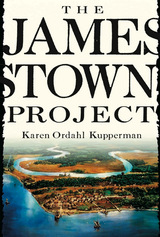
Listen to a short interview with Karen Ordahl KuppermanHost: Chris Gondek | Producer: Heron & Crane
Captain John Smith's 1607 voyage to Jamestown was not his first trip abroad. He had traveled throughout Europe, been sold as a war captive in Turkey, escaped, and returned to England in time to join the Virginia Company's colonizing project. In Jamestown migrants, merchants, and soldiers who had also sailed to the distant shores of the Ottoman Empire, Africa, and Ireland in search of new beginnings encountered Indians who already possessed broad understanding of Europeans. Experience of foreign environments and cultures had sharpened survival instincts on all sides and aroused challenging questions about human nature and its potential for transformation.
It is against this enlarged temporal and geographic background that Jamestown dramatically emerges in Karen Kupperman's breathtaking study. Reconfiguring the national myth of Jamestown's failure, she shows how the settlement's distinctly messy first decade actually represents a period of ferment in which individuals were learning how to make a colony work. Despite the settlers' dependence on the Chesapeake Algonquians and strained relations with their London backers, they forged a tenacious colony that survived where others had failed. Indeed, the structures and practices that evolved through trial and error in Virginia would become the model for all successful English colonies, including Plymouth.
Capturing England's intoxication with a wider world through ballads, plays, and paintings, and the stark reality of Jamestown--for Indians and Europeans alike--through the words of its inhabitants as well as archeological and environmental evidence, Kupperman re-creates these formative years with astonishing detail.
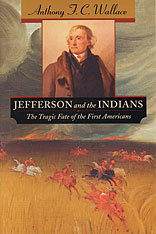
In Thomas Jefferson's time, white Americans were bedeviled by a moral dilemma unyielding to reason and sentiment: what to do about the presence of black slaves and free Indians. That Jefferson himself was caught between his own soaring rhetoric and private behavior toward blacks has long been known. But the tortured duality of his attitude toward Indians is only now being unearthed.
In this landmark history, Anthony Wallace takes us on a tour of discovery to unexplored regions of Jefferson's mind. There, the bookish Enlightenment scholar--collector of Indian vocabularies, excavator of ancient burial mounds, chronicler of the eloquence of America's native peoples, and mourner of their tragic fate--sits uncomfortably close to Jefferson the imperialist and architect of Indian removal. Impelled by the necessity of expanding his agrarian republic, he became adept at putting a philosophical gloss on his policy of encroachment, threats of war, and forced land cessions--a policy that led, eventually, to cultural genocide.
In this compelling narrative, we see how Jefferson's close relationships with frontier fighters and Indian agents, land speculators and intrepid explorers, European travelers, missionary scholars, and the chiefs of many Indian nations all complicated his views of the rights and claims of the first Americans. Lavishly illustrated with scenes and portraits from the period, Jefferson and the Indians adds a troubled dimension to one of the most enigmatic figures of American history, and to one of its most shameful legacies.

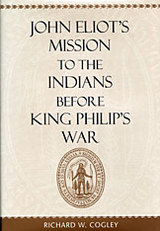
No previous work on John Eliot's mission to the Indians has told such a comprehensive and engaging story. Richard Cogley takes a dual approach: he delves deeply into Eliot's theological writings and describes the historical development of Eliot's missionary work. By relating the two, he presents fresh perspectives that challenge widely accepted assessments of the Puritan mission.
Cogley incorporates Eliot's eschatology into the history of the mission, takes into account the biographies of the proselytes (the "praying Indians") and the individual histories of the Christian Indian settlements (the "praying towns"), and corrects misperceptions about the mission's role in English expansion. He also addresses other interpretive problems in Eliot's mission, such as why the Puritans postponed their evangelizing mission until 1646, why Indians accepted or rejected the mission, and whether the mission played a role in causing King Philip's War.
This book makes signal contributions to New England history, Native American history, and religious studies.
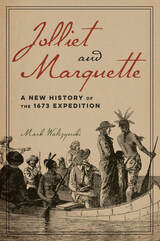
A multifaceted voyage into the past, Jolliet and Marquette expands and updates the oft-told story of a pivotal event in American history.
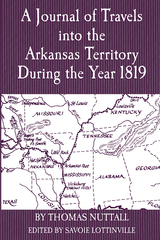
This is the famous naturalist Thomas Nuttall's only surviving complete journal of his American scientific explorations. Covering his travels in Arkansas and what is now Oklahoma, it is pivotal to an understanding of the Old Southwest in the early nineteenth century, when the United States was taking inventory of its acquisitions from the Louisiana Purchase.
The account follows Nuttall's route from Philadelphia to Pittsburg, down the Ohio River to its mouth, then down the Mississippi River to the Arkansas Post, and up the Arkansas River with a side trip to the Red River. It is filled with valuable details on the plants, animals, and geology of the region, as well as penetrating observations of the resident native tribes, the military establishment at Fort Smith, the arrival of the first governor of Arkansas Territory, and the beginnings of white settlement.
Originally published in 1980 by the University of Oklahoma Press, this fine edited version of Nuttall's work boasts a valuable introduction, notes, maps, and bibliography by Savoie Lottinville. The editor provided common names for those given in scientific classification and substituted modern genus and species names for the ones used originally by Nuttall. The resulting journal is a delight to read for anyone—historian, researcher, visitor, resident, or enthusiast.
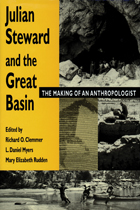
Julian Steward and the Great Basin is a critical assessment of Steward’s work, the factors that influenced him, and his deep effect on American anthropology. Steward (1902–1972) was one of the foremost American exponents of cultural ecology, the idea that societies evolve in adaptation to their human and natural environments. He was also central in shaping basic anthropological constructs such as "hunter-gatherer" and "adaptation." But his fieldwork took place almost entirely in the Great Basin.
In one sense, the phases of Steward’s career epitomize the successive schools of anthropological theory and practice. Each chapter explores a different aspect of his work ranging from early efforts at documenting trait distributions to his later role in the development of social transformation theory, area studies, and applied anthropology.
Julian Steward and the Great Basin also corrects long-standing misperceptions that originated with Steward about lifeways of the Indians living between the Great Plains and California. It charts new directions for research, demanding a more exacting study of environmental conditions, material adaptations, and organizational responses, as well as an appreciation of the ideological and humanistic dimensions of Basin Life.
READERS
Browse our collection.
PUBLISHERS
See BiblioVault's publisher services.
STUDENT SERVICES
Files for college accessibility offices.
UChicago Accessibility Resources
home | accessibility | search | about | contact us
BiblioVault ® 2001 - 2024
The University of Chicago Press









